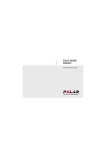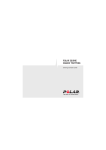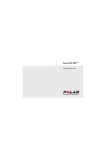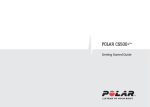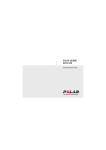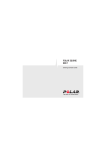Download Polar RC3 User's Manual
Transcript
POLAR EQUINE RC3 GPS Getting Started Guide CONTENTS 1. CONTENTS OF THE SET . . . . . . . . . 3 8. TROUBLESHOOTING. . . . . . . . . . . . . 19 2. BUTTON FUNCTIONS . . . . . . . . . . . . 5 3. CHARGE THE TRAINING COMPUTER . . . . . . . . . . . . . . . . . . . . . . 6 9. IMPORTANT INFORMATION . . . . . 21 Care and Maintenance. . . . . . . . . . . 21 Battery Information . . . . . . . . . . . . . . 23 Service . . . . . . . . . . . . . . . . . . . . . . . . . . 26 Guarantee . . . . . . . . . . . . . . . . . . . . . . . 26 Disclaimer . . . . . . . . . . . . . . . . . . . . . . . 30 4. ATTACH THE BELT. . . . . . . . . . . . . . . 8 5. ATTACH THE ELECTRODE BASE. . . . . . . . . . . . . . . . . . . . . . . . . . . . . 11 6. WEAR THE SOFT STRAP . . . . . . . . . 15 7. START TRAINING RECORDING . . . . . . . . . . . . . . . . . . . . . 16 1. CONTENTS OF THE SET 1. 2. 3. Polar RC3 GPS training computer: With an integrated GPS unit the RC3 GPS provides speed, distance, altitude, ascent and descent data, as well as route information at the polarpersonaltrainer.com web service, using Global Positioning System (GPS) technology. Heart rate sensor: The comfortable heart rate sensor detects the horse's heart rate accurately from the heart's electrical signals and sends the data to the training computer in real time. USB cable: Connect the Polar RC3 GPS training computer to your computer with the USB cable to charge the battery and to transfer data between the training computer and the polarpersonaltrainer.com web service. You can download both this Getting Started Guide (available in English, German, French, Italian, Spanish, Finnish and Swedish) and the full user manual for the RC3 GPS training computer at www.polar.com/support. For video tutorials, go to http://www.polar.com/en/polar_community/videos. ENGLISH 3 4. Polar Equine Belt is included in the Polar Equine RC3 GPS Trotting set (#93048830). For instructions on using the belt, see Attach the Belt (page 8). 5. Polar Equine Electrode Base is included in the Polar Equine RC3 GPS set (#93048828). For instructions on using the electrode base, see Attach the Electrode Base (page 11). 6. With your Polar RC3 GPS you receive a new Polar Soft strap. The plastic electrode areas on the reverse side of the strap detect your heart rate. Data from all compatible sensors is sent wirelessly to the training computer over the 2.4 GHz W.I.N.D. technology, proprietary to Polar. This eliminates interference during training. 4 ENGLISH 2. BUTTON FUNCTIONS LIGHT • Illuminate the display • Press and hold to enter QUICK MENU: In time view lock buttons, set alarm or select time zone. During training lock buttons, search sensor, adjust training sounds, set automatic lap on/off, show GPS info or show zone limits. BACK • Exit the menu • Return to previous level • Leave settings unchanged • Cancel selections • Press and hold to return time mode from any other mode. UP • Move through selection lists • Adjust a selected value • Press and hold to change the watch face. START/OK • Confirm selections • Start training session • Take a lap • Press and hold to set zone lock on/off in training mode. DOWN • Move through selection lists • Adjust a selected value • Press and hold to switch between Time 1/ Time 2. ENGLISH 5 3. CHARGE THE TRAINING COMPUTER The RC3 GPS has an internal, rechargable battery. Charge the RC3 GPS via a USB connection on your computer by using the USB cable that comes with the product set. If you want to plug the USB connector to a wall outlet, use a USB power adapter (not included in the product set). 1. 2. 3. 4. Plug the micro USB connector into the USB port in the RC3 GPS. Plug the USB connector into a computer USB port. It is recommended not to use USB hubs because a USB hub may not supply enough power for the RC3 GPS. The charging animation appears on the display. Fully charging the battery takes up to 1,5 hours. When the RC3 GPS is fully charged, Charging complete is displayed. Disconnect the cable. Use a USB 1.1/2.0 compliant cable included in the set package. The charging time may be prolonged if you charge from a USB hub. 6 ENGLISH The RC3 GPS goes to basic settings after the first charge. To enter the basic settings during the charge, press any button. Enter Basic Settings You must enter the basic settings, even though they don’t concern the horse. If you don’t enter the basic settings, the RC3 GPS training computer will remind you to set them before every exercise. 1. 2. First, select your language. Confirm your selection with START . Please enter basic settings is displayed. Press START and start entering the data by using the UP/DOWN buttons and confirm your selections with START . For detailed information on the settings of RC3 GPS, consult the full user manual at www.polar.com/support. ENGLISH 7 4. ATTACH THE BELT Polar Equine Belt is included in the Polar Equine RC3 GPS Trotting set (#93048830) 1. 2. Belt: The plastic electrode areas (A, B) on the reverse side of the belt detect heart rate. The pocket (C) protects the heart rate sensor from shocks and scratches and prevent it from falling off the belt. Heart rate sensor: The heart rate sensor sends the heart rate signal to the training computer. For video tutorials, go to http://www.polar.com/en/polar_community/videos. 8 ENGLISH 1. For the heart rate sensor to read the heart rate properly, ensure a good contact between the plastic electrode areas and the horse’s skin. Wet the belt properly, for example in a bucket of water (1). 2. Also wet the horse’s hair from the areas where the electrodes of the belt are placed (2). If your horse has long or thick hair, you can clip it from those areas where the electrodes are placed. This will greatly improve the heart rate signal quality. 3. Attach the heart rate sensor to the pocket (3). Close the pocket firmly. ENGLISH 9 4. Place the belt as indicated (4), with the heart rate sensor pocket on the left side of the horse. By doing so, you ensure the electrodes of the belt being in the right position. 5. Using contact gel on the electrodes of the belt is recommended. It ensures a better detection of the horse’s heart rate. The gel should be placed on the electrodes areas on the reverse side of the belt. The range of the heart rate sensor is over 10 m, therefore you can follow your horse's heart rate also when lunging. For video tutorial, go to http://www.polar.com/en/polar_community/videos. See the training computer user manual for instructions on displaying the horse's heart rate and recording a training session. The user manual can be downloaded at www.polar.com/support. 10 ENGLISH 5. ATTACH THE ELECTRODE BASE 1. 2. 3. Equine Electrode Base detects the electrical signal of every heart beat. It has a pocket for the heart rate sensor and two electrodes. The positive electrode is marked with a plus sign and the negative electrode is marked with a minus sign. Heart rate sensor measures the horse’s heart rate in real time and sends this information continuously and wirelessly to the training computer. Two plastic straps for attaching the electrode base. ENGLISH 11 Polar Equine Electrode Base is included in the Polar Equine RC3 GPS set (#93048828) 1. Attach the heart rate sensor to the pocket of the electrode base. Close the pocket firmly. 2. The heart rate sensor picks up very small electrical impulses emitted by the heart. For the heart rate sensor to read the heart rate properly, ensure a good contact between the electrode pads and the horse’s skin. Wet the electrode pads and the horse's hair properly from the areas where the electrode pads are placed (see the figure). If your horse has long or thick hair, you can clip those areas. This greatly improves the heart rate signal quality. To optimize the contact between the horse's skin and the electrode pads, you can use contact gel on the electrode pads. It ensures a better detection of the horse’s heart rate. 12 ENGLISH See the images on this and the following page. 3. Attach the pocket to the saddle with one of the plastic straps (3). 4. Place the positive electrode pad (short cable) under the saddle (4) on the left side of the horse. Ensure that the electrode side of the pad is against the horse's skin (5). The rider’s weight will keep the electrode in place. 5. Attach the negative electrode pad (long cable) under the girth using a plastic strap (6) and tighten the girth. If needed, you can place a wet sponge between the negative electrode pad and girth to ensure good contact with the skin. For video tutorial, go to http://www.polar.com/en/polar_community/videos. See the training computer's user manual for instructions on displaying the horse's heart rate and recording a training session. The user manual can be downloaded at www.polar.com/support. ENGLISH 13 14 ENGLISH 6. WEAR THE SOFT STRAP 1. 2. 3. 4. Moisten the electrode area of the strap. Attach the heart rate sensor to the strap. Tie the strap around your chest, just below the chest muscles, and attach the hook to the other end of the strap. Adjust the strap length to fit tightly but comfortably. Check that the moist electrode areas are firmly against your skin and that the Polar logo of the heart rate sensor is in a central and upright position. Detach the heart rate sensor from the strap and rinse the strap under running water after every use. Sweat and moisture may keep the electrodes wet and the heart rate sensor activated. This will reduce the heart rate sensor battery life. For more detailed washing instructions, see Important Information (page 21). ENGLISH 15 7. START TRAINING RECORDING See the full RC3 GPS user manual at www.polar.com/support for detailed information on functions during training. Start a training session by pressing START . 16 ENGLISH 1. When you start a training session for the first time, Searching for new heart rate sensor is displayed. The RC3 GPS searches for a heart rate sensor signal. 2. Heart rate sensor found is displayed, once the RC3 GPS finds the signal. This action is called pairing and is performed only once to the heart rate sensor. Pairing ensures that your RC3 GPS receives signal from your heart rate sensor only, and enables interference-free training when there are other training computer's around. 3. Select the sport profile you want to use by browsing with UP/DOWN. If you have activated the GPS function in this sport profile, the RC3 GPS will automatically start searching for the signal. You can set the function on in MENU > Settings > Sport profiles > Running/Cycling/Other Sport . 4. To catch the GPS satellite signals, go outdoors and away from tall buildings and trees. Wear the training computer with the face upwards on your wrist. Keep the training computer in a horizontal position in front of you and away from your chest. Keep your arm stationary and raised above the level of your chest during the search. Do not move your arm during the search. Keep still! Stand still and hold the position until the training computer has found the satellite signals (an alarm sounds and a check mark appears on the arm of the figure once the signal is found). In good conditions, finding the satellite signals for the first time typically takes 30-60 seconds. ENGLISH 17 5. The check mark indicates that the signal is found. In this image the RC3 GPS has found the heart rate sensor signal and the GPS signal. If the RC3 GPS does not find the signal, the display shows a triangle with an exclamation mark. Once the RC3 GPS has found all the signals, press START . Recording started is displayed, and you can start recording your training session. Button functions • • • • • • Change the training view on display by browsing with UP/DOWN. Access the QUICK MENU by pressing and holding LIGHT for two seconds. Record a lap by pressing START . Lock a zone by pressing and holding START . Pause your training session by pressing BACK. Stop training recording completely by pressing BACK twice. After Training You can see details of the training session by selecting MENU > Data > Training files . For a more visual and detailed analysis, transfer the data to polarpersonaltrainer.com web service with the WebSync software. Consult the full RC3 GPS user manual or the online help for polarpersonaltrainer.com and WebSync for more information. 18 ENGLISH 8. TROUBLESHOOTING Abnormal Heart Rate Readings During Exercise • • • • • • • Make sure the positions of the electrode pads are correct and they are right side up. Check also that the girth is tight enough. Make sure the horse’s hair under the electrode pads is thoroughly moistened. If your horse has long or thick hair, clip it from the areas where the electrode pads are placed. Accumulated sweat and dirt may interfere with the measurement of the signal from the heart to the transmitter. Check if the electrode pads need cleaning. Make sure that the hear rate sensor is firmly attached to the pocket of the electrode base. Keep the training computer and the heart rate sensor on the same side of the horse. In some cases, (at about 120 bpm) a double pulse can occur at each heart beat (R + T waves). This problem disappears when the intensity increases. If you have done all of the above-mentioned actions, and the heart rate measurement does not work, the battery of your heart rate sensor may be empty. How can I best catch satellite signals? Wear the training computer with its face upwards on your wrist. Keep your wrist stationary and raised above the level of your chest during the search. Stand still and hold the position until the training computer has found the satellite signals. How do I ensure a good GPS signal reception in RC3 GPS? The best GPS signal reception can be reached when training in an open area where there are no obstructions for the satellite signals. Due to the nature of the GPS signal, for example hills, tall buildings, and trees may block the satellite signal. Rain, fog, and snow may also affect the signal quality. Wear the training computer with its face upwards on your wrist. The training computer does not find or it takes long time to find the satellite signals Something in your surroundings may be blocking GPS satellite signal reception (e.g. ENGLISH 19 underpasses, tall buildings, terrain or forested areas). Go outdoors and away from tall buildings and trees. In good conditions, acquiring satellite signals for the first time typically takes 30-60 seconds. Note that the GPS reception does not work indoors. The speed or distance readings are incorrect or irregular Something in your surroundings may be blocking GPS satellite signal reception (e.g. underpasses, tall buildings, terrain or forested areas). If the training computer cannot locate the satellite signals, it will not be able to calculate its location. Distance is measured between the last location before the shadow area and the first location after the shadow area in a straight line. 20 ENGLISH What is the measurement accuracy of Polar RC3 GPS? Polar RC3 GPS training computer measurement accuracy is +/- 2% for distance and +/- 2km/h for speed. When moving at low speeds (below 3km/h) accuracy of this level can sometimes cause relatively big errors. However, with higher speeds the measurement is more accurate. See the full RC3 GPS user manual at www.polar.com/support for more information. 9. IMPORTANT INFORMATION Care and Maintenance Follow the caring instructions to ensure reliable measurement and to maximize the life span of the electrode base and the heart rate sensor. The following instructions will help you fulfill the guarantee obligations. Training computer Keep your training computer clean. Use a damp paper towel to wipe dirt from the training computer. To maintain the water resistance, do not wash the training computer with a pressure washer. Do not immerse the training computer in water. Never use alcohol or any abrasive material such as steel wool or cleaning chemicals. Not suitable for bathing or swimming. Protected against wash splashes and raindrops. Do not immerse the training computer in water. Using the training computer in excessive rainfall may cause interference on GPS reception. Keep your training computer in a cool and dry place. Do not keep it in a damp environment, in non-breathable material (a plastic bag or a sports bag) nor with conductive material (a wet towel). Do not expose the training computer to direct sunlight for extended periods, such as by leaving it in a car or mounted on the bike mount. It is recommended to store the training computer partially or fully charged. The battery slowly loses its charge when it is stored. If you are going to store the training computer for several months, it is recommended to recharge it after a few months. This will prolong the battery lifetime. ENGLISH 21 Heart rate sensor: Detach the heart rate sensor Soft strap: Rinse the strap under running water from the electrode base/belt/soft strap after every use and dry it with a soft towel. Clean the heart rate sensor with a mild soap and water solution when needed. Never use alcohol or any abrasive material (e.g. steel wool or cleaning chemicals). Dry and store the electrode base/belt/soft strap and the heart rate sensor separately to maximize the heart rate sensor battery lifetime. To prevent snap oxidation, do not store the heart rate sensor wet in non-breathing material, such as a sports bag. Do not expose the heart rate sensor to direct sunlight for extended periods, such as by leaving it in a car. after every use and hang to dry. Clean the strap gently with a mild soap and water solution when needed. Do not use moisturizing soaps, because they can leave residue on the strap. Do not soak, iron, dry clean or bleach the strap. Do not stretch the strap or bend the electrode areas sharply. You may wash the strap in a washing machine at 40 °C / 104 °F. Strap material: 38% Polyamide, 29% Polyurethane, 20% Elastane, 13% Polyester Electrode Base / Belt: Rinse under running water after every use and hang to dry. Clean the electrode areas gently with a mild soap and water solution when needed or at least once a week. Do not use moisturizing soaps, because they can leave residue on the electrodes. Do not soak, iron, dry clean or bleach. Do not stretch the electrode base/belt or bend the electrode areas sharply. 22 ENGLISH Storing the Electrode base / Belt / Soft strap: Keep your electrode base/belt/soft strap in a cool and dry place. Do not keep them in a damp environment, in non-breathable material (a plastic bag or a sports bag) nor with conductive material (a wet towel). Do not expose them to direct sunlight for extended periods, such as by leaving it in a car. Battery Information Battery operating time Training Computer • The training computer contains a rechargeable battery. Polar encourages you to minimize possible effects of waste on the environment and human health by following local waste disposal regulations and, where possible, utilizing separate collection of electronic devices at the end of the working life of the product. Do not dispose of this product as unsorted municipal waste. Rechargeable batteries have a limited number of charge cycles. You can charge and discharge the battery over 300 times before a notable decrease in its capacity. The number of charge cycles also varies by use and operating conditions. The battery will be 70-80% full after one hour of charging. Charging the battery fully takes up to 1,5 hours. • • in continuous use when recording a training session with the GPS function ON: up to 12 hours in continuous use when recording a training session with the GPS function OFF: up to 1700 hours when you train on average 1h/day, 7 days/week: • with the GPS function ON: up to 11 days • with the GPS function OFF: up to 120 days • when only the time view is used: up to 4 months The operating time varies depending on operating conditions (e.g. high or low temperatures) and battery aging. The operating time is significantly reduced in temperatures well below freezing. Wearing RC3 GPS under your overcoat helps to keep it warmer and to increase the operating time. To learn when to recharge the battery, see the full user manual at www.polar.com/support. ENGLISH 23 Heart Rate Sensor The Polar heart rate sensor has a user changeable battery. When changing the battery, make sure the sealing ring is not damaged, in which case you should replace it with a new one to ensure the water resistance of the connector. You can purchase the sealing ring/battery kits at well-equipped Polar retailers and authorized Polar Services. In the USA and Canada, the additional sealing rings are available at authorized Polar Service Centers. In the USA the sealing ring/battery kits are also available at www.shoppolar.com. When handling a new, fully charged battery, avoid clasp-like contact, i.e. simultaneous from both sides, with metal or electrically conducting tools, like tweezers. This may short-circuit the battery causing it to discharge more rapidly. Typically, short circuiting does not damage the battery, but it may decrease the capacity and lifetime of the battery. 24 ENGLISH To change the battery: 1. 2. 3. 4. Lever the battery cover open by using the bracket on the strap. Remove the old battery from the battery cover with a suitable sized small ridgid stick or bar, such as a toothpick. A non-metal tool is preferable. Be careful not to damage the battery cover. Insert a new battery (CR 2025) inside the cover with the negative (-) side outwards. Align the ledge on the battery cover with the slot on the connector and press the battery cover back into its place. You should hear a snap. Keep the batteries away from children. If swallowed, contact a doctor immediately. Batteries should be properly disposed of according to local regulations. Danger of explosion if the battery is replaced with wrong type. ENGLISH 25 Service During the 12-month guarantee/warranty period we recommend that you have service, other than battery replacement, done by an authorized Polar Service Center only. The warranty does not cover damage or consequential damage caused by service not authorized by Polar Electro. For contact information and all Polar Service Center addresses, visit www.polar.com/support and country specific websites. • • • Guarantee Limited International Polar Guarantee for Equine Products • Polar Equine products are developed and manufactured for the usage in equine sports. Each product endures rigorous testing before it leaves the factory. • This guarantee does not affect the customer’s statutory rights under applicable national or state laws in force, or the customer’s rights against the dealer arising from their sales/purchase contract. • This limited Polar international guarantee is issued by Polar Electro Inc. for customers who have purchased this product in the USA or Canada. This limited Polar international 26 ENGLISH • • • guarantee is issued by Polar Electro Oy for customers who have purchased this product in other countries. Polar Electro Oy/Polar Electro Inc. guarantees the original customer/purchaser of this device that the product will be free from defects in material or workmanship for twelve (12) months from the date of purchase. The receipt of the original purchase is your proof of purchase! The guarantee does not cover the battery, normal wear and tear, damage due to misuse, abuse, accidents or non-compliance with the precautions; improper maintenance, cracked, broken or scratched cases/displays, modified or altered products or their parts and electrode belt and strap of sensors. The guarantee does not cover any damage/s, losses, costs or expenses, direct, indirect or incidental, consequential or special, arising out of, or related to the product. Items purchased second hand are not covered by warranty, unless otherwise stipulated by local law. During the guarantee period, the product will be either repaired or replaced at any of the authorized Polar Service Centers regardless of the country of purchase. Guarantee with respect to any product will be limited to countries where the product has been initially marketed. Regulatory information is available at www.polar.com/support. Compliance Statement Canada Polar Electro Oy has not approved any changes or modifications to this device by the user. Any changes or modifications could void the user’s authority to operate the equipment. Polar Electro Oy n’a approué aucune modification apportée à l’appareil par l’utilisateur, quelle qu’en soit la nature. Tout changement ou toute modification peuvent annuler le droit d’utilisation de l’appareil par l’utilisateur. Industry Canada (IC) regulatory information Under Industry Canada regulations, this radio transmitter may only operate using an antenna of a type and maximum (or lesser) gain approved for the transmitter by Industry Canada. To reduce potential radio interference to other users, the antenna type and its gain should be so chosen that the equivalent isotropically radiated power (e.i.r.p.) is not more than that necessary for successful communication. This device complies with Industry Canada licence-exempt RSS standard(s). Operation is subject to the following two conditions: (1) this device may not cause interference, and (2) this device must accept any interference, including interference that may cause undesired operation of the device. Avis de conformité à la réglementation d’Industrie Canada Conformément à la réglementation d'Industrie Canada, le présent émetteur radio peut fonctionner avec une antenne d'un type et d'un gain maximal (ou inférieur) approuvé pour l'émetteur par Industrie Canada. Dans le but de réduire les risques de brouillage radioélectrique à l'intention des autres utilisateurs, il faut choisir le type d'antenne et son gain de sorte que la puissance isotrope rayonnée équivalente (p.i.r.e.) ne dépasse pas l'intensité nécessaire à l'établissement d'une communication satisfaisante. ENGLISH 27 Le présent appareil est conforme aux CNR d'Industrie Canada applicables aux appareils radio exempts de licence. L'exploitation est autorisée aux deux conditions suivantes : (1) l'appareil ne doit pas produire de brouillage, et (2) l'utilisateur de l'appareil doit accepter tout brouillage radioélectrique subi, même si le brouillage est susceptible d'en compromettre le fonctionnement. FCC regulatory information Class B digital device notice Note: This equipment has been tested and This Class B digital apparatus complies with Canadian ICES-003, RSS-Gen and RSS-210. Cet appareil numérique de la classe B est conforme à la norme NMB-003, CNR-Gen et CNR-210 du Canada. USA Polar Electro Oy has not approved any changes or modifications to this device by the user. Any changes or modifi cations could void the user’s authority to operate the equipment. 28 ENGLISH This device complies with part 15 of the FCC rules. Operation is subject to the following two conditions: (1) This device may not cause harmful interference, and (2) This device must accept any interference received, including interference that may cause undesired operation. found to comply with the limits for a Class B digital device, pursuant to part 15 of the FCC Rules. These limits are designed to provide reasonable protection against harmful interference in a residential installation. This equipment generates, uses and can radiate radio frequency energy and, if not installed and used in accordance with the instructions, may cause harmful interference to radio communications. However, there is no guarantee that interference will not occur in a particular installation. If this equipment does cause harmful interference to radio or television reception, which can be determined by turning the equipment off and on, the user is encouraged to try to correct the interference by one or more of the following measures: 1. 2. 3. 4. Reorient or relocate the receiving antenna. Increase the separation between the equipment and receiver. Connect the equipment into an outlet on a circuit different from that to which the receiver is connected. Consult the dealer or an experienced radio/ TV technician for help. This product emits radio frequency energy, but the radiated output power of this device is far below the FCC radio frequency exposure limits. This equipment complies with FCC RF radiation exposure limits forth for an uncontrolled environment. Nevertheless, the device should be used in such a manner that the potential for human contact with the antenna during normal operation is minimized. This crossed out wheeled bin marking shows that Polar products are electronic devices and are in the scope of Directive 2002/96/EC of the European Parliament and of the Council on waste electrical and electronic equipment (WEEE) and batteries and accumulators used in products are in the scope of Directive 2006/66/EC of the European Parliament and of the Council of 6 September 2006 on batteries and accumulators and waste batteries and accumulators. These products and batteries/accumulators inside Polar products should thus be disposed of separately in EU countries. ENGLISH 29 This marking shows that the product is protected against electric shocks. Copyright © 2013 Polar Electro Oy, FI-90440 KEMPELE. Polar Electro Oy is a ISO 9001:2008 certified company. All rights reserved. No part of this manual may be used or reproduced in any form or by any means without a prior written permission of Polar Electro Oy. The names and logos marked with a ® symbol in this user manual or in the package of this product are registered trademarks of Polar Electro Oy. Disclaimer Please note that these guarantee terms shall be applied to Polar Equine products instead of any other Polar Electro guarantee term, even if other terms may appear in some product documentation. 30 ENGLISH Manufactured by Polar Electro Oy Professorintie 5 FIN-90440 KEMPELE Tel +358 8 5202 100 Fax +358 8 5202 300 www.polar.com































